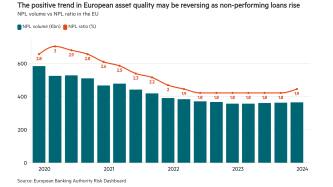Read more
- Italian firms are tapping into the country’s growing wealth management sector
- An ageing demographic means that firms need to adapt their services to cater to younger generations
- Market volatility will force wealth management firms to adjust or be pushed aside
As European markets emerge from years of economic uncertainty and ageing populations turn their attention towards estate planning, the wealth management industry could see extraordinary growth in 2024, say experts. To capitalise on this, Italian firms are moving to expand their reach within the industry.
Italian investment bank Mediobanca has launched a wealth management and investment services division, one of the few financial institutions in Italy to do so.
In January, the Milan-based bank launched Mediobanca Premier, a new division of the bank that will tap into the medium-high market segment, where it plans to provide advisory and wealth management products and services to Italian clients.
“The Italian wealth management sector is large, but the majority of its assets remain vastly unmanaged,” says Gian Luca Sichel, CEO of Mediobanca Premier. “For this reason, the market has a lot of potential, and we are seeing very strong macro trends that are reshaping the business.”
Generational shift
Luigi Capitanio, senior partner, north and south Europe strategy consulting leader at Deloitte, says that demographic decline and the increase in the average age of clients is currently causing the polarisation of wealth in “high-potential customers”, which will ultimately result in a large generational transition of assets.
“Italy has an increasingly ageing population that is driving the demand for retirement planning solutions, estate management and wealth transfer services, specifically connected to generational transition,” says Capitanio. “In the coming years, we expect massive transfers of wealth from one generation of clients to the next.”
Within the EU, Italy is one of the jurisdictions with the fastest ageing demographic. According to data from the country’s National Institute of Statistics, as of January 1 2023, there were roughly 15mn people above the age of 65 living in Italy, which account for almost one quarter (24.1 per cent) of the total population.
“Today, some 70 per cent of Italy’s wealth is concentrated in the hands of people who are over 60 years of age,” says Sichel. “However, studies have shown that within the next five years, a big chunk of the wealth ownership will change hands, bringing a high level of generational change that will see younger generations taking over these assets.”
While the Mediobanca Group is already an established player within the Italian wealth management sector, with €94bn in assets under management, Mediobanca Premier puts the sector at the core of its operations. Some of the division’s products and services available through its platform include investment advisory, asset management tools and succession planning services.
Sichel says that Mediobanca Premier provides an array of products that are meant to serve the younger generations, including special advisory services for young professionals who do not yet have much in the way of savings, as well as tools for minors that are “consistent with the wealth position of their families”, which include credit cards for underage customers.
Additionally, Sichel adds that firms need to change the way that they approach younger generations because “you don’t only have to adapt your tools, but you also need to keep up with new technological advancements and make sure that your advisers are proficient in their use”.
He says that Mediobanca is testing artificial intelligence solutions across functions and products, from the automation of internal processes to asset allocation and portfolio creation.
Future prospects
Despite the existence of pockets of untapped potential within wealth management, the area is likely to remain volatile in 2024 due to a variety of factors, including geopolitical events and their impact on the supply chain, rising inflation and economic slowdowns.
According to a 2023 PwC report, one in six asset and wealth management firms globally are expected to go out of business or be assimilated by bigger players over the next five years. As a result, a growing number of firms are considering entering into partnerships with other asset managers or making technological investments to boost their performance within the market.
“Market players are aware that not all business models will survive and that the firms that today are adopting a distinctive value proposition have a better chance at competing in the medium to long term,” says Capitanio.
He adds that a potential slowdown in the growth of the economy and the rise in costs could force industry players to define their positions and objectives over the next three years, having a direct impact on the market.
“I see two potential options for firms. Either they will have to work to position themselves within the largest market players and turn their size into their greatest asset, or they will have to choose a specialisation and find a market niche where they can focus on products and services that can satisfy specific customer needs,” he says.
Sichel says that, although he hopes that volatility will decrease in the short term, it has to be incorporated into Mediobanca Premier’s risk assessment plans and its work to map and serve clients' needs.












